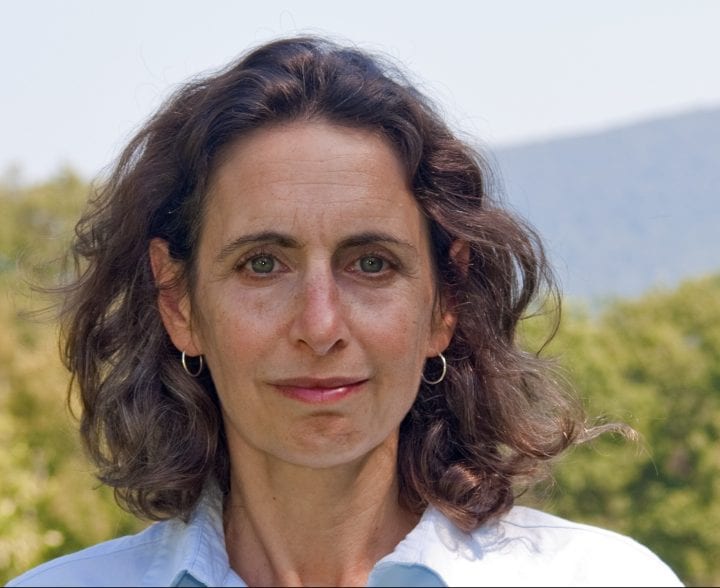This event will be streamed online—click the “Learn More” button to see details. While the COVID-19 crisis is unfolding on the world stage, what Elizabeth Kolbert has to say about our changing climate is just as pressing as it ever was. Kolbert, author of the Pulitzer Prize-winning book, The Sixth Extinction, has traveled from Alaska to Greenland, visiting top scientists to get to the heart of the debate over global warming. Join us online to commemorate the 50th anniversary of Earth Day.
We are happy to say that we will be able to stream Elizabeth Kolbert’s event online (and for a week after—more on that below). We hope that offering Kolbert’s event in a new format will enable you to hear her compelling message and commemorate Earth Day 2020 from the safety of your home. Kolbert’s lecture will only be available to ticket holders, streamed digitally on lectures.org, at the original date and time of her event. The event will also be available online for a week afterwards, so you can hit the “pause” button and return to it at your leisure. Closer to the event, we will send ticket holders a password they will use to access her event with further instructions.
Because we believe in the importance of Earth Day, we are also excited to announce that the Q&A portion of the evening, moderated by local journalist Sam Howe Verhovek, will be FREE and open to the public for streaming beginning at approximately 8:30 on April 22 at lectures.org.
Elizabeth Kolbert’s The Sixth Extinction: An Unnatural History, a book about mass extinctions that weaves intellectual and natural history with reporting in the field, was a New York Times 2014 Top Ten Best Book of the Year and is number one on the Guardian’s list of the 100 Best Nonfiction Books of all time. The Sixth Extinction also won the 2015 Pulitzer Prize in the General Nonfiction category and was a finalist for the National Book Critics Circle awards for the best books of 2014. As with Field Notes from a Catastrophe, The Sixth Extinction began as an article in The New Yorker.
Growing out of a groundbreaking three-part series in The New Yorker (which won the 2005 National Magazine Award in the category Public Interest), Field Notes from a Catastrophe: Man, Nature, and Climate Change brings the environment into the consciousness of the American people and asks what, if anything, can be done, and how we can save our planet.
Kolbert explains the science and the studies, draws frightening parallels to lost ancient civilizations, unpacks the politics, and presents the personal tales of those who are being affected most—the people who make their homes near the poles and, in an eerie foreshadowing, are watching their worlds disappear. Field Notes from a Catastrophe: Man, Nature, and Climate Change was chosen as one of the 100 Notable Books of the Year (2006) by the New York Times Book Review.
Elizabeth Kolbert has been a staff writer for The New Yorker since 1999. She has written dozens of pieces for the magazine, including profiles of Hillary Clinton, Mayor Michael Bloomberg, and former Mayor Rudolph Giuliani. Her series on global warming, “The Climate of Man,” appeared in The New Yorker in the spring of 2005 and won the American Association for the Advancement of Science’s magazine award. Also in 2006, she received the National Academy of Sciences Communication Award in the newspaper/magazine category and was awarded a Lannan Writing Fellowship.
In September 2010, Kolbert received the prestigious Heinz Award which recognizes individuals who are addressing global change caused by the impact of human activities and natural processes on the environment. She has also been awarded a 2010 National Magazine Award in the Reviews and Criticism category for her work in The New Yorker, and the Sierra Club’s 2011 David R. Brower Award. She recently won the Walter Sullivan Award for Excellence in Science Journalism from the American Geophysical Union. In 2016 she was named the 12th Janet Weis Fellow in Contemporary Letters at Bucknell University. She is also the recipient of the 2016 Sam Rose ’58 and Julie Walters Prize at Dickinson College for Global Environmental Activism. In 2019 she was the recipient of the Pell Center Prize for Story in the Public Square.
Kolbert’s stories have also appeared in The New York Times Magazine, Vogue, and Mother Jones, and have been anthologized in The Best American Science and Nature Writing and The Best American Political Writing. She edited The Best American Science and Nature Writing 2009. A collection of her work, The Prophet of Love and Other Tales of Power and Deceit, was published in 2004. Prior to joining the staff of The New Yorker, Kolbert was a political reporter for the New York Times.
Sam Howe Verhovek, our Q&A moderator for this event, has been a reporter for the New York Times and the Los Angeles Times for more than twenty-five years. His assignments have taken him around the globe, from riots in India, to the war in Iraq, and on the longest school bus ride in America.


